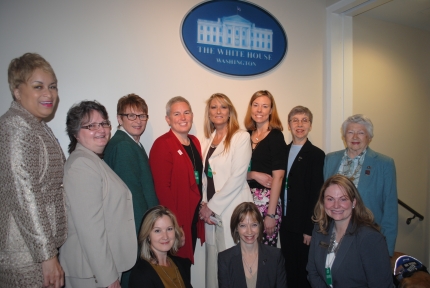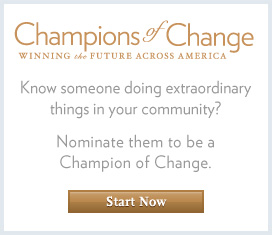Champions of Change Blog
Unite Here
Posted by on March 29, 2013 at 4:19 PM EDT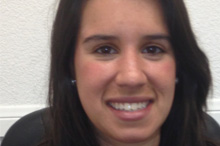 Yvanna Cancela is being honored as a Champion of Change for her efforts as an Immigration Reformer.
Yvanna Cancela is being honored as a Champion of Change for her efforts as an Immigration Reformer.
It is a tremendous honor to accept the Champions of Change Award because the life and work of Cesar Chavez inspires me every day. Chavez's legacy continues on in the hundreds of thousands of workers who come together to demand justice. I am proud to call these men and women my union sisters and brothers.
When staying at a hotel, most people don't think about the housekeeper who made their bed, the kitchen worker who cleaned their plate, or the cook who prepared their meal. UNITE HERE has worked for decades to ensure these “invisible workers” and their basic needs – good healthcare, decent wages and job security – are not overlooked. The union has provided thousands of people the opportunity to provide better lives for themselves and their families. In Las Vegas, the Culinary Workers Local 226 has helped build the city's middle class. The union has focused on empowering its members to win their contracts and ultimately their future.
However, the work of the labor movement goes beyond the workplace. My work is centered on ensuring workers have a strong voice in their communities. I was lucky to land in Las Vegas as a neighborhood organizer during the 2010 elections. For most of five months, I spent every day knocking on doors and talking to voters in predominantly Latino neighborhoods. This gave me a clear understanding of local issues facing Las Vegans, including a weak education system and lackluster housing market. In my time at the union, I have been able to work with members and tackle these challenges head on.
During the 2011 Legislative session, Local 226 founded an organization called Nevada Students Unite Here. I directed a campaign to support education funding and prevent budget cuts. Our campaign led to over 8,000 contacts with students, parents, and union members who were deeply concerned with the issues. Ultimately, by working with community and political allies, we were able to guarantee that devastating cuts were not made to the education budget. It was tremendously empowering to represent our members and their families on such an important issue. As the Legislature convenes again this year, I am working on helping to pass legislation that protects underwater homeowners. I’m also focused on bills that will improve the quality of care in Nevada’s healthcare system.
The most important work I am doing involves union members and immigration reform. As the daughter of immigrants, it is tremendously important for me that comprehensive reform be made a reality. It is easy to understand why UNITE HERE has been at the forefront of the immigration debate. My union represents workers from more than 100 countries. In Vegas alone there are workers from 84 nations. These members came in search of a better future, one with good jobs and opportunities for their families. Ten years ago, my union organized the Immigrant Workers Freedom Ride as part of a national campaign for comprehensive reform. We have stood by the DREAMers, hosted DACA application fairs, and will do whatever it takes to support the Administration’s push for reform. I have the privilege of speaking to workers about this issue and mobilizing them into action.
Cesar Chavez envisioned a world where all workers, regardless of their job or nationality could have dignity in the workplace. By training union members to be leaders at work and in their communities, I believe UNITE HERE is making Chavez’s vision a reality.
Yvanna Cancela is the political director at UNITE HERE’s Local 226, the Culinary Workers Union.
Learn more about"The Better Angels of Our Nature"
Posted by on March 29, 2013 at 3:27 PM EDT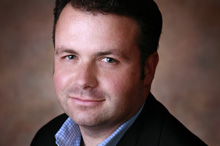 Jason Mathis is being honored as a Champion of Change for his efforts as an Immigration Reformer.
Jason Mathis is being honored as a Champion of Change for his efforts as an Immigration Reformer.
Many people were deeply concerned about the direction Utah was headed the summer of 2010. Arizona had just passed SB 1070 requiring police to question people about their immigration status and Utah seemed destined to follow the same course. Legislators were lining up to support a carbon copy of the Arizona law and polling showed support from 65 percent of the state. People were being told that compassion was a dirty word. Anyone who spoke for a rational approach was accused of supporting amnesty – and the way they said amnesty let you know that they didn’t think it was a good thing.
I always felt we could do better. The vitriol that engulfed the immigration discussions didn’t truly represent the people of my community. There is a core of decency and goodness here as there is in many other places across our country. If we could empower people with a little courage we could move the discussion to a more constructive place. Working with my colleagues at the Salt Lake Chamber we started to strategically talk about immigration in a more values-based way. We hoped to create a chorus of voices who could “appeal to the better angels of our nature.” The Utah Compact was the outgrowth of this effort.
The document is a simple and elegant rebuttal to “what part of illegal don’t you understand?” The 224 words of The Utah Compact focus on five core values: Federal Solutions, Law Enforcement, Families, the Economy, and a Free Society. The Utah Compact was literally written by dozens of people. The original draft may have lived on my laptop, but by the time the document was released it had been edited and improved by many other voices including political officials, captains of industry, law enforcement officers and religious leaders from many faiths. Every word was thoughtfully considered and every phrase was nuanced.
A signing ceremony with community leaders was held at the Utah State Capitol on November 11, 2010. Within a few days the New York Times ran an editorial about The Utah Compact that read:
A clearer expression of good sense and sanity than Utah’s would be harder to find. It says that immigration is an issue between the federal government and other countries – “not Utah and other countries.” It says local police agencies should focus on fighting crime, “not civil violations of federal code.” Because “strong families are the foundation of successful communities” it opposes policies that unnecessarily separates them. It recognizes immigrants’ value as workers and taxpayers. It ends by urging a humane approach to the reality of immigration: “Utah should always be a place that welcomes people of good will.
The Times editorial was followed by endorsements in local and national publications including the Wall Street Journal, Washington Post and Los Angeles Times. An editorial in the Arizona Republic urged the Copper State to follow Utah’s example. Indeed, immigration leaders in a dozen other states have since adopted similar compacts, encouraging elected leaders to adopt a reasonable approach to immigration reform in their own communities.
By the time the Utah Legislature met in January, 66 percent supported comprehensive reform – a swing of nearly 40 percent in three months. The Utah Compact was not the only force driving this sea change, but it was a clarifying moment in what was otherwise a heated and destructive conversation. By authentically speaking to core American values, The Compact holds a mirror up to immigration questions and asks us to find a better way. The resulting laws based on The Utah Compact are not perfect. But they set our community on a pragmatic path that embraces compassion and human kindness. The appeal of The Utah Compact comes from its simplicity and authenticity. It changed the trajectory of Utah’s policies and the national discussion by creating a more civil and comprehensive approach to immigration reform.
Jason Mathis is the executive director of Salt Lake City’s Downtown Alliance and EVP of the Salt Lake Chamber.
Learn more aboutA Nation of Immigrants
Posted by on March 29, 2013 at 2:56 PM EDT Matthew Soerens is being honored as a Champion of Change for his efforts as an Immigration Reformer.
Matthew Soerens is being honored as a Champion of Change for his efforts as an Immigration Reformer.
Like many other Americans, most of what I thought about issues of immigration throughout most of my life was based on what I saw on television, heard on the radio, or read in the newspaper. Some was positive, much was negative, and none of it seemed to affect me directly, particularly where I grew up, in the mostly ethnically homogenous part of Northeastern Wisconsin. Over the past several years, though, I’ve been challenged to see the various ways that my own values – those of our country, of my faith, and of my family – compel me to see immigration in a different light. Through my work at World Relief, where our mission is to empower local churches to serve the most vulnerable, including refugees, victims of human trafficking, and undocumented immigrants, I now have the privilege of encouraging others within my faith community to rediscover their values and to apply them to the complex and sometimes controversial topic of immigration.
The United States of America is, as John F. Kennedy called it, “a nation of immigrants.” Except for those of Native American ancestry, we all can trace our heritage back to somewhere else, whether our ancestors came on the Mayflower or a slave ship, into Ellis Island or Angel Island, into JFK Airport or across the Rio Grande. At its founding, America was, as our first president said, “open to receive not only the opulent and respectable stranger, but the oppressed and persecuted of all nations and religions.” Though at various moments in our history we have not fully lived up to that standard, it remains core to our national identity. I’m inspired by my Dutch immigrant ancestors, and I see reflections of their courage in the immigrants arriving today.
My faith teaches me that I must remember not only my immigrant ancestors’ valor and ingenuity, but also God’s grace in bringing them from the desperation they left behind, through immense struggles upon arrival in a new country where they were not always welcomed, to rebuilding a new life in the United States. In the Hebrew Scriptures, God commands his people to remember their own history as foreigners in the land of Egypt and to allow their own experience to inform the way that they would treat those who migrated to their land later: “Don’t oppress an immigrant,” God says very clearly. “You know what it’s like to be an immigrant, because you were immigrants…” (Exodus 23:9, Common English Bible). God repeatedly commands his people, as individuals and as a society, to care for those who are most vulnerable, specifically mentioning the immigrant, the orphan, and the widow on multiple occasions. The Bible is replete with commands to hospitality – literally, the love of strangers – with the suggestion that by welcoming strangers, we might just be welcoming an angel without realizing it (Hebrews 13:2).
That reality – that immigrants, rather than people to be feared, may actually be a blessing – has been the experience of my own family. When I was just a small child, my mother met a young woman who had recently arrived from Mexico in the nursing mothers’ room of our church. Putting the values of her own faith into action, my mother befriended the young woman and invited her over for lunch. When she learned that the young immigrant and her baby were living in a dangerous situation of domestic violence, my mother invited them into our home, where they lived in our basement for several months while getting back onto their feet. In the process, they became a part of our family, enriching our lives in countless ways.
When we apply our values – American values, values of our faith traditions, family values – to the realities of immigration to the United States, our national dialogue transforms from a fixation on an imagined threat to the recognition of a tremendous opportunity. We can then work together across partisan, religious, geographic, and ethnic divides to establish laws that reflect our shared values and to build a society that welcomes those who arrive as strangers into our communities. As we do so, our country, our faith communities, and our families are strengthened in the process.
Matthew Soerens is the U.S. Church Training Specialist at World Relief and the co-author of Welcoming the Stranger: Justice, Compassion & Truth in the Immigration Debate.
Learn more aboutWe're Not Illegal, We're Not Immoral, We're Not "Them" - We Are All "Us!"
Posted by on March 29, 2013 at 2:15 PM EDT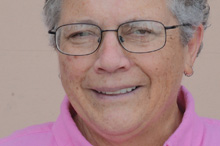 Judy Rickard is being honored as a Champion of Change for her efforts as an Immigration Reformer.
Judy Rickard is being honored as a Champion of Change for her efforts as an Immigration Reformer.
Since I came out as a lesbian in 1973 I have worked to stop discrimination and create equality in my San Francisco Bay Area community. In the early days it was hard to get people to listen to what I had to say in my fight against discrimination based on sexual orientation. It wasn't easy being different then and it wasn't easy trying to get discrimination to stop. Little by little, working in community, I helped make a difference and helped make people safer and more equal. But my story has not really changed - it just gets longer. Discrimination is still out there. When I was in my late 50s I ran into the biggest and baddest discrimination yet - from my own American government. And it was because of the best thing that had happened to me in years: I fell in love.
Nothing is more personal than who you are, who you love, and how you create family. But because of who I am and who I love and how I have created my family, America forced me to choose between spouse and career, spouse and country, spouse and family, life as I knew it and an unknown future. That's not right! No American should have to face such choices. For me and my wife, and an estimated thirty-six thousand other such families, our futures are not our own. DOMA determines them. So my work to fight discrimination amped up big time.
When I met my wife and we fell in love and committed to each other, we had no idea it would mean lots of separation and possibly leaving America, a future that still looms for us. I never thought I would have to leave my country to stay with my wife. Who would imagine that? It shouldn't be a risk, a problem, against the law to love and commit to someone born in another country. But we have paid a big price by being different, being a same-sex binational couple. We have been apart half of our time together because we are both women and not both American citizens. We have faced expenses and problems and stress that most people don't have to deal with just to be partners, family, loved ones.
When the hammer dropped five years ago, I made the right choice, the only one. I took early retirement with a reduced pension for the rest of my life so that my wife and I would be together more than apart. Why? Because Karin was detained in a cell at the San Francisco International Airport and told she was visiting the U.S. too often. She was told to get her affairs in order and leave the country for a long time. She wasn't even allowed to visit me for the usual six months. Her crime? She had been visiting too often.
I knew we had to fight this discrimination and realized we needed a tool to share the information. My book, Torn Apart: United by Love, Divided by Law, is part memoir, part a collection of stories of others' who are discriminated against by DOMA, part a how-to on how others can help and part resource guide. It keeps getting updated with my blog and web site at http://tornapart.findhornpress.com.
Sharing my story - personal and political - is how I roll. Letters to editors, conferences, phone calls, blogs; you name it, I do it. As my book came out, I met more allies. I got more press. I talked to elected officials. I spoke at churches. I spoke to organizations and conferences. I shared with LGBT seniors and youth. But the most powerful efforts by far were dialogues with immigrant groups. We learned of each other’s struggles and found commonality. I learned to go outside my comfort zone. And it just keeps going. Sharing that story. Finding those allies. Blogging. Posting on Facebook. Creating a Facebook page for my book. Creating a portrait project of same-sex binational couples. Creating a Facebook page for that. Working on the solution we all need. Sharing. Connecting. Making friends. Making community.
So here I am, being honored as a Cesar Chavez Champion of Change. Something else new has happened to me because of my story. But the truth is very personal. Here it is: immigration, like sexual orientation, is not a skin color, or a country of origin, or a religion, or a culture, or an ethnicity. It's all that and more. It's not "them." It's "us." We need a country where we are all "us." Let's make it so!
Some people think of immigrants and hold the word "illegal" in their hearts and minds. Some people think of the LGBT community and hold the word "immoral" in their hearts and minds. Imagine how that makes people like me and my wife feel! We live in that world where these two intersect - it's like pouring gas on a fire when people who hold illegal and immoral in their hearts and minds think of LGBT immigrants and same-sex binational families. These categories, LGBT and immigrant, are the two most volatile subjects in politics today. Who is going to help us? Who will include us in comprehensive, common sense immigration reform?
DOMA is at the Supreme Court this week. Three bills are working their way slowly through Congress. President Obama has spoken out for people like me and my wife. I'm 65 now. My wife is 72. I sure hope to spend whatever remains of my golden years being able to do other things than fight to keep my wife with me. In my country we say that's the American dream: life, liberty, and the pursuit of happiness. I'd like an unimpeded chance at that. So would lots of others.
Judy Rickard is the author of Torn Apart: United by Love, Divided by Law and works to promote civil rights.
Learn more aboutChampions of Change: Women Veterans
Posted by on March 21, 2013 at 6:55 PM EDTIt is our honor to celebrate the many accomplishments of our women veterans as our Champions of Change. At this time in our Nation's history there are more women serving in our Armed Forces than ever before. Since the creation of the Army Nurse Corps in 1901 women have been faithfully serving in our Armed Forces as nurses, mechanics, pilots, ship captains, unit commanders and more. In these jobs women have found themselves on the front-lines, but by the Administration's decision to lift the ban on combat positions to women gives them a chance to serve in all military roles. The opportunities in and out of military service continue to expand for women. For many of them their selfless service does not end when they take off the uniform for the last time, instead they continue to serve not only their communities, but also the very people they stood side-by-side with.
Marsha Four is a shining example one of these women. She served in the Army as a nurse during the Vietnam War. After leaving the service she was determined to help her fellow veterans and founded a 95-bed transitional home for homeless veterans. She also founded Mary E. Walker House, transitional residence program for homeless women veterans.
Marsha's story is just one of the many you will get to hear today from women who have dedicated their lives to the service of others. We are thrilled to be able to honor 14 incredible women in our Champions of Change event. Following their military service, these women have integrated back into the communities and become leaders in their schools, business, and local governments.
We couldn't possibly capture all the amazing contributions our women veterans are making across the nation. But we remain dedicated to the commitment we have made to all veterans. The Administration continues to demonstrate this promise by signing the Veteran Skills to Jobs Act, VOW to Hire Heroes Act, and an Executive Order to strengthen suicide prevention and veteran mental health care services. Joining Forces, led by First Lady Michelle Obama and Dr. Jill Biden, continue to enlist community and local support by securing veteran hiring commitments from corporations around the country, establishing educational commitments from state and national nursing organizations and nursing schools, and campaigning for state credentialing and licensing legislation to assist veterans in translating their hard earned skill sets to the civilian sector.
It is the combined dedication of the women we honor as Champions of Change, our local communities, corporations nationwide, the Administration, and many more that secure our Nation's commitment to those who serve. We were excited about the day's events, and excited to meet some of these amazing women.
Champions for Change: Women Veterans
- Sharie Derrickson, Nashville TN. A Navy veteran and Vice President of New Wind, LLC who sought out energy start-up companies to join.
- Priscilla Mondt, Fayetteville AR. An Army & Desert Storm veteran with Bronze Star, as a VA Chaplain she runs a scholarship program for other chaplains.
- Glenna Tinney, Arlington VA. A retired Navy Captain who has managed military domestic violence and sexual assault programs as a former Dep. Director of the Defense Task Force on Domestic Violence and current Program Coordinator for the Battered Women’s Justice Project.
- Stacy Pearsall, Charleston SC. An Army veteran with three tours in Iraq which led to Bronze Star two time winner of NPPA Military Photographer of the Year. She owns Charleston Center for Photography and donates art to the Charleston VAMC.
- Ginger Miller, Accokeek MD. A Coast Guard veteran and founder of Women Veterans Interactive (formerly John 14:2), which has a Guidstar.org seal of approval. She is formerly homeless and started these organizations to assist other women veterans with their point of need.
- Natasha Young, Boston MA. A Marine veteran, Gunny Sgt, who deployed to Iraq twice and lost 6 marines during her deployments. She was selected as a Mission Continues fellow and was then hired as an Outreach Coordinator.
- Wilma Vaught, Arlington VA. Founder of Women In Military Service For America Memorial Foundation (WIMSA). Brigadier General Wilma L. Vaught, USAF, Retired, is President of the Board of Directors of the Women In Military Service For America Memorial Foundation, Inc. Her last military assignment was as Commander of the US Military Entrance Processing Command, North Chicago, IL, where she served from June 1982, until her retirement in August 1985. She is a member of the Board of Directors of the National Women’s History Museum and serves on the Virginia War Memorial Foundation Board of Trustees. Following retirement, she worked as a consultant with the Strategic Defense Initiative Organization as well as with industry. She speaks around the US on leadership and management and is a frequent guest on radio and television programs.
- Marsha Four, Springfield PA. An Army veteran, Vietnam nurse and founder of a 95-bed transitional housing residence (LZ II) for homeless Veterans recovering from substance abuse. She is also the founder of the Mary E. Walker House, transitional residence program for homeless women Veterans located on the grounds of Coatesville VA Medical Center.
- Marylyn Harris, Houston TX. An Army veteran and nurse who created Women Veterans Business Center to educate and empower women Veterans and military families to start and grow their own businesses.
- Becky Kanis, Los Angeles CA. An Army veteran and director of the 100,000 Homes Campaign, a national movement of over 185 communities working to find permanent homes for chronic and medically vulnerable homeless Americas.
- Kayla Williams, Ashburn VA. An Army & Operation Iraqi Freedom Veteran who advocates on Veterans policy issues, especially those that promote gender equality in the military and equal access to benefits and services for women Veterans. Served on the Advisory Committee on Women Veterans. Actively participates on panel, radio, and television discussion on women’s combat experiences, to help stakeholders, policy makers, and the public gain an understanding of how combat can impact the lives of the women who experience it.
- Michelle Racicot, Albuquerque NM. An Army Operation Enduring Freedom & Operation Iraqi Freedom veteran, nurse practitioner. She is on the advisory board of American Women Veterans, and a community advocate (fundraiser/educator/volunteer) on homelessness.
- Dawn Halfaker, Arlington VA. An Army Operation Enduring Freedom & Operation Iraqi Freedom veteran and founder and CEO of Halfaker and Associates. President of the Board of Directors for Wounded Warrior Project.
- Tia Christopher, Davis CA. A Navy Veteran who currently works for the Farmer-Veteran Coalition as the Director of FVC’s Fellowship Fund. Ms. Christopher speaks nationally on issues facing women veterans, has testified before state and national legislature, and was a community instructor for the National Center for PTSD, Menlo Park. Christopher serves as an advisory board member for The Pathway Home: California Transition Center for Care of Combat Veterans.
Rosye Cloud is the Director of Policy for Veterans, Wounded Warriors, and Military Families.
Learn more aboutThe Best and Worst in Humanity
Posted by on March 21, 2013 at 6:54 PM EDT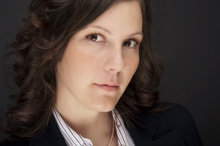 Stacy Pearsall is being honored as a Champion of Change for her efforts as a woman veteran.
Stacy Pearsall is being honored as a Champion of Change for her efforts as a woman veteran.As a combat photographer, I traveled to over 42 countries documenting military training exercises and real-world operations. I witnessed and documented the best and worst in humanity. Over the course of my time spent in the warzone, the implements of war injured me as well as the unseen wounds combat vets often struggle with. In an effort to maintain my tough-guy persona, I hid my physical and emotional pain from those around me. As a woman, I’d worked hard to earn the respect of my peers and I didn’t want to give them any reason to think I wasn’t capable of completing the mission. However, one final injury I sustained during an ambush in Iraq made hiding that pain impossible. My physical wounds ultimately ended my active duty military career.
Learn more about
- &lsaquo previous
- …
- 76
- 77
- 78
- 79
- 80
- 81
- 82
- 83
- 84
- …
- next &rsaquo

